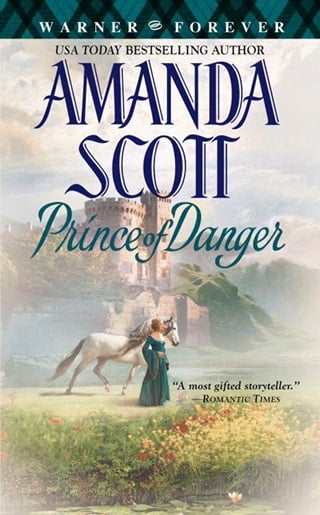Prologue
Prologue
West Loch Tarbert, Scotland, October 1307
Fingers of thick night mist crept in from the sea, shrouding the dark forests and glens of Knapdale and Kintyre in ragged cloaks of gray and veiling the stars and the slender crescent moon overhead as four ships, barely visible, passed one by one into west Loch Tarbert. Although their sails were furled for lack of wind to fill them, the ships moved silently on the inflowing tide, like hulking black ghosts.
The small watcher on the hillside, having successfully escaped the confines of his bedchamber to breathe the damp air of freedom, began to fear that if the mist rose much higher off the loch, he would not find his bedchamber again that night. The consequences of that might be painfully severe, but freedom from authority, even for an hour, was worth the risk, especially with ghost ships for entertainment.
Curious to learn how such large galleys could move so silently without wind to drive them or any splashing of oars, he moved quietly down the hill, nearer the shore. General visibility was even worse near the water, but he could still discern the ghostly black shapes through the mist.
Now, faintly, came the occasional splash of an oar, although not the heavy, rhythmic splat and splash one associated with galleys as their great banks of oars flashed in and out of the water to the beat of a helmsman's gong. Nor did the ghost ships' gliding progress resemble the speedy pace of those greyhounds of the sea.
A moment later, the curtain of mist parted enough to reveal that the ship directly in front of him followed a smaller towboat, the oars of which made little sound as they dipped gently in and out of the water. And if the mist was not distorting other sounds he heard, a second towboat moved between him and the bulk of the ship, telling him that smaller boats were towing the galleys into the loch.
The child frowned. Should he run and warn someone? Had the men-at-arms who usually guarded the loch entrance all fallen asleep? He could not imagine such a thing happening, not when the penalty for dereliction was a hangman's noose and a speedily dug grave. But perhaps the wee folk had cast a spell over the guards.
He would face punishment if he told anyone, because then his father would find out that he had disobeyed him. But it was curiosity, not fear of punishment, that made him decide to follow the boats farther up the loch. Galleys required at least twenty-six oarsmen, sometimes four times that number, and might carry men-at-arms, too. Before he told anyone, he should acquire more information if he could.
Moments later, as he paused after scrambling around a boulder in his path, a rattle of stones behind him nearly stopped his breathing. Standing perfectly still, he fought to calm his pounding heart as his ears strained to hear more.
Another rattle, a scraping sound as if someone had slipped, and a hastily-suppressed cry brought a sigh of irritation when he recognized the voice.
He waited grimly where he was, blocking the way, until his small follower scrambled around the boulder. The result was a startled, louder cry when they met.
"Shut your mug or by the Rood, I'll shut it for ye," he hissed.
"Aye, sure, but ye scairt me near t' death!"
"I'll do worse than that if ye dinna hush up. D'ye no see them ships?"
"O' course, I do. Whose are they?"
"I dinna ken," he muttered. "But if any man wi' them sees or hears us, he'll likely cut off our heads and fling 'em in the loch so we canna tell anyone else."
"Faith, why should anyone do that, when your own da's wi' them?"
The lad frowned. "He is?"
"Aye, for I near bumped into him when I ran through the hall t' catch up wi' ye. I had t' dive under the high table whilst he rousted out some o' his men sleeping on the lower-hall floor t' go wi' him and me own da' t' meet the strangers."
"We'll ha' to get back quick then," he decided, suppressing disappointment. "Sithee, someone will catch us if we don't, and that'll get us both skelped sure. I warrant we'll learn all about them ships anyhow, come morning."
But the next morning, when the sun shone brightly on the loch again, the ships were gone. Not a ripple remained to bear testimony to their passage.
 Fullepub
Fullepub 



